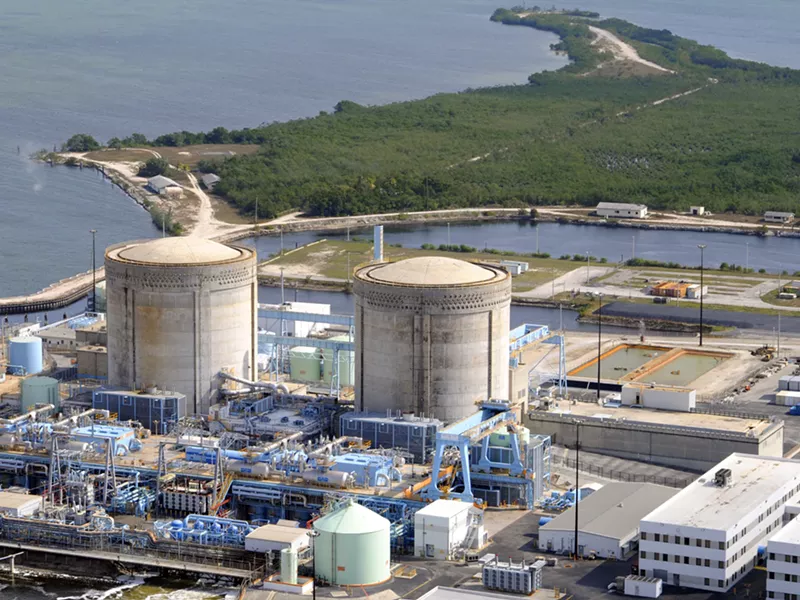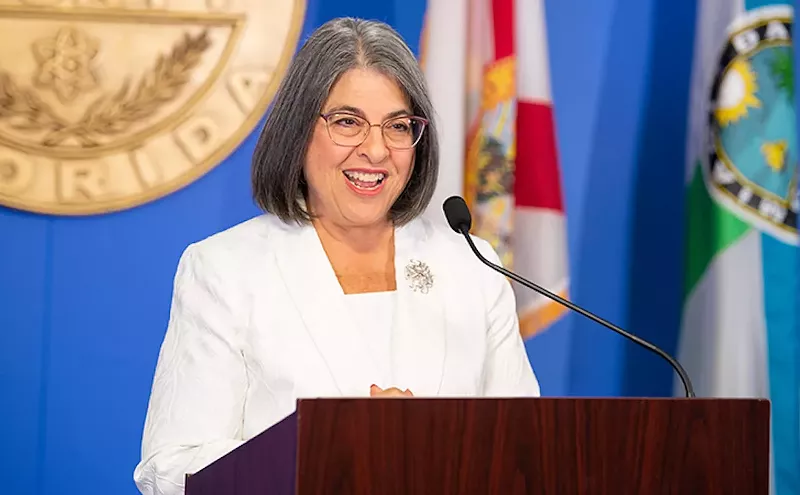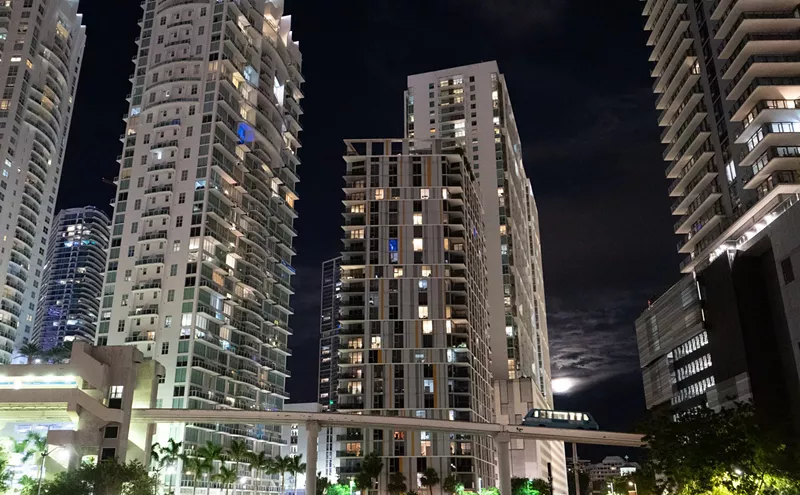There are so many scandals swirling around FPL's Turkey Point Nuclear Generating Station in Homestead that it's difficult to keep track of them all. Here's a summary of the biggest three:
One, the company wants to expand the plant and inject its radioactive waste into the low-lying "Boulder Zone" of the Floridan Aquifer, which sits perilously close to Miami-Dade's drinking water.
Two, the power plant is the only station to use so-called cooling canals instead of the typical smokestack-style cooling towers used at every other nuclear plant on Earth. Those canals are leaking, and environmentalists are fighting to force FPL to stop using them.
Three, and most important today, those leaks have created a gigantic plume of saltwater around the plant that's seeping into the Biscayne Aquifer, Miami's major drinking water source.
Last year, FPL came up with a plan to fix those leaks, but environmentalists quickly pounced on it, arguing the fix could seriously hurt the Everglades by diverting water from the vital ecosystem. Among those protesting the plan were the county's Department of Environmental Resources Management (DERM) and the Southern Alliance for Clean Energy (SACE).
Despite those concerns, the South Florida Water Management District (SFWMD) last week issued what is essentially a rubber stamp for FPL to begin the project.
The saltwater plume has been growing for decades, but it was only last year that Miami-Dade County confirmed that Turkey Point's cooling canals were leaking into the bay. In general, independent environmentalists largely agree Turkey Point is situated in a dreadful location for a
The state has demanded that FPL
When FPL proposed the cleanup plan September 16, green activists warned it could cause
"The first thing you have to do is deal with the
But SACE says even the remediation plan is flawed. In short, activists say, the plan to pump water out of the aquifer is likely to suck out too much
"The model that they put together to show that their plan would work was completely flawed," conservation expert Laura Reynolds tells New Times. "For example, they did not account for evaporation. So the net result was that the model showed more water in the system than there actually was. And even with the incorrect extra water in their models, some still showed damage to the wetlands."
SACE warns that the plan could hurt water supplies "responsible for rehydrating estuaries across the southeast end of Florida that are thirsty for clean, fresh water."
Likewise, there are also concerns about pumping saltwater into the Boulder Zone. Though the zone is naturally full of extremely salty water, SACE says the amount of saltwater FPL wants to pump into the zone is unprecedented — and concerning, because multiple government studies have warned that the zone could leak into groundwater sources.
Reynolds works as a contractor for SACE, which has long sparred with FPL on pollution issues. Last year, SACE issued a white paper detailing its concerns about a plan that was supposed to fix environmental pollution in South Florida:
If FPL or one of the state agencies responsible for protecting water resources of the state corrected this model and accounted for the technical problems that our experts identified, the net result would be less water in the system than FPL is claiming, so therefore a greater impact to adjacent wetlands and the progress of Everglades restoration. The only way to retract the plume safely would be to slow the operations and pumps to protect the wetlands and water resources."A corrected model shows that cleanup efforts could negatively impact nearby wetlands and Everglades restoration," the paper says.
In response to the latest concerns, FPL spokesperson Peter Robbins denied that SACE's contentions had any merit.
SACE’s “concerns” about this issue were written for them by bought-and-paid-for consultants with a well-established anti-FPL track record. SACE itself is an anti-utility, anti-nuclear political group that has a demonstrated history of attacking electric utilities with misleading claims in order to further its own fundraising efforts.SACE, however, isn't the only group that has asked FPL to take another look at the science. On September 29, Miami-Dade County issued its own review of the plan, which asked for a "reevaluation" of the environmental modeling techniques FPL used to craft its approach. The county listed seven points that needed extra examination from FPL — including the fact that the existing test runs didn't incorporate "significant water features such as quarries" or "significant recreational (e.g., golf courses) and other water users" nearby.
FPL’s inclusive, science-driven approach to Turkey Point included input from FPL customers, environmental groups, elected officials, governmental agencies, independent industry experts, and regulatory agencies.
The recovery well system is specifically designed to draw back the hypersaline plume gradually and without harming wetlands. The majority of the plume will be retracted in the first five years, but complete retraction will take longer. This is done to avoid any adverse environmental impacts.
But despite the list of issues, the South Florida Water Management District — led by Gov. Rick Scott's former attorney, Peter Antonacci — issued FPL a permit to approve the plan February 27 without addressing any of the environmental issues.
"I really wish the state would have made them fix the model before issuing the permits, but to my knowledge, that has not been done," Reynolds, the contractor, tells New Times. "DERM has issues with it, everyone has concerns, all the experts, yet they’re moving ahead, to my knowledge."
Reynolds applauds the Water Management District for forcing FPL to report each of its water withdrawals to the
Smith, meanwhile, simply stresses that the only permanent solution to the problem is ridding Florida of the cooling-canal system rather than sucking more water out of the ground.
Yesterday the state published a notice in the Miami Herald announcing the SFWMD planned to approve FPL's project. Before the permits are approved, residents have a brief period when they can object to the order and request a hearing.
Reynolds and Smith says it's too early to tell if SACE will request a
"We haven’t researched that yet, but we're committed to pointing out the failings of their model," Smith says. "We're going to demand that the South Florida Water Management District does its job and protects natural resources. Anything less than that, we will point it out."
Here's the full permit:













